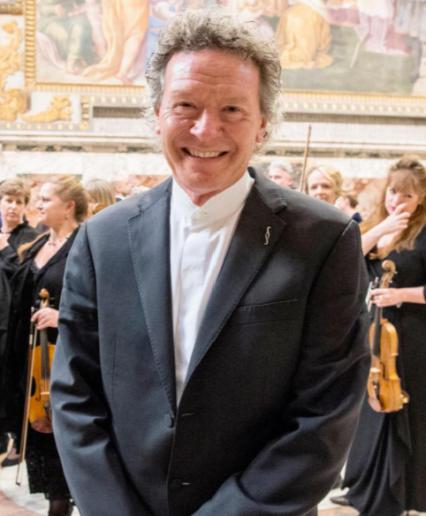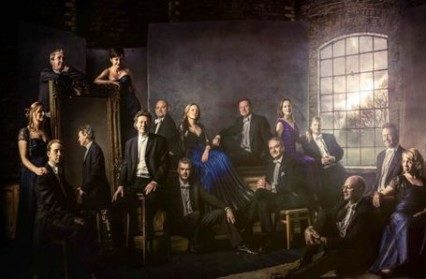Nigel Jarrett was at St David’s Hall in Cardiff to review a concert by The Sixteen, one of the most renowned choirs in the world, conducted by Harry Christophers.
Carols sung to accompany the seasonal filling of the cash tills signal a religious festival degraded literally beyond belief. Outside a church or cathedral, among the lapsed and unbelievers, they have lost their meaning; inside them, they are part of an age-old Christian repertoire that reminds us how important religious houses once were in the preservation and pursuit of music. That carols and other Christmas music are still being written is due either to a composer’s faith or to a recognition that a religion, though widely debased by materialism, is there to be consolidated or revived. The length and richness of that tradition in England and in terms of centuries, was celebrated at this concert of music centred on the Virgin and Child.
Well, not every century. The intention here was obviously to contrast, first, plainchant and the polyphony that stemmed from it and, second, religious music ancient and modern. Missing in terms of musical history were the 18th and 19th centuries. Perhaps in the 16th and early 17th, the Catholic church as a potent force bred great music out of restoration, under Mary Tudor, and tolerable persecution, under Elizabeth. In the two later periods, the glory days of plainsong and Renaissance polyphony were imitated when composers were not slaves to the latest Viennese styles. Anyway, conductor Harry Christophers knew what he was doing in not only making these comparisons but also linking music that possessed the same meditative tone and temperament.

Every Sixteen concert is an education, and one of the lessons that flowed from this visit, the second of an eight-venue December tour and part of the St David’s Hall international season, was how strongly religious sentiment and belief galvanised each of the composers represented, be it Thomas Tallis, incorporating the plainsong ‘Puer natus est nobis’ into the Gloria from his mass of the same name, or James MacMillan, with the hymn-like O Radiant Dawn, one of his English-language Strathclyde motets. The Tallis Mass, still threadbare and seemingly incapable of full recovery, at least has the Gloria intact, giving an indication of how the chant was distributed throughout the polyphony to give a feeling of solidity and space, features which the choir fully exploited. As the programme switched from antique to modern-day, it was remarkable how the differences in compositional approach seemed diminished in importance by the universal theme, MacMillan’s invocations and multiple ‘Amens’ notwithstanding.
Certainly John Tavener’s simple setting of William Blake’s The Lamb and the wondrous stasis of his O, do not move were placed in the programme to show how a miniature could sustain a mood or transform joy into ecstasy, a condition liable in music to outstay its welcome. The way they were sung here, with a lightness and intensity that belied their reputation for being diatonic potboilers meant to beguile the crowd, said much for the choir’s even-handed approach to its material. The Lamb seemed an ideal transition between the Tallis Mass and a set of miniatures that included, as well as the MacMillan piece, Basil Ord’s setting of Adam lay ybounden and the traditional ditty Rejoice And Be Merry. This last turned out to be a forerunner of the choir’s encore, Ding Dong Merrily On High. There were similar gems, including a sparer version of Adam lay ybounden by Howard Skempton, Alec Roth’s delightful setting of Crashaw in Song Of The Shepherds, and another Ave Maria to round off the programme, this time a slowly unravelling version by Robert Parsons from the second half of the 16th century. Not least among them was Gabriel Jackson’s The Christ-child, a setting of Chesterton in as delicious an example of contemporary church style as its conservatism permits.
But not before weightier matter in the form of Walter Lambe’s Nesciens mater, based on the eponymous plainchant; the soaring architecture of Tallis’s Videte miraculum; Byrd’s devotional Ave Maria, written by a composer who had long coped with the pressure of remaining a Catholic under Protestant rule; and Peter Philips’s O beatum et sacrosanctum diem, the penultimate advertised piece to be performed but as wondrously contemplative as anything that had preceded it. That complexity was almost always full choral but nonetheless sometimes involved re-arrangement and highlighting of solo voices, markedly so in Richard Pygott’s carol Quid petis, O fili?, with its blend of sacred and profane and the hiving off of a mini-choir – soprano, counter-tenor, tenor and bass – to effect its imitative polyphony. The re-shuffle reminded us that there were eighteen singers on stage. Sixteen was the original number and simply provided a name for the choir that stuck.
Their ethereal sound, the result of intricate and clear textures consistently sustained and elegantly woven, was unfazed by a variety of devotional music whose similarities often appeared to be no less striking than its differences. But it was all by composers linked to the church through religious faith or sympathies. Without those, such music would be difficult, if not impossible, to write. That’s why the Old Testament has provided more vivid inspiration for composers not so firmly committed, if at all. This was New Testament all the way and the journey provided a haven of responses to Christmas uncorrupted.
Header photo credit: Molinavisuals
The Sixteen
St David’s Hall, Cardiff, December 11 2015
Conductor: Harry Christophers
Plainsong: Puer natus est nobis
Tallis: Gloria from Missa Puer natus est nobis; Videte miraculum
Tavener: The Lamb; O, do not move
Ord: Adam lay ybounden
Traditional: Rejoice and be merry
MacMillan: O Radiant Dawn
Jackson: The Christ-child
Byrd: Ave Maria
Plainsong: Nesciens mater
Lambe: Nesciens mater
Skempton: Adam lay ybounden
Pygott: Quid petis, O fili?
Traditional: A child is born in Bethlehem
Roth: Song of the Shepherds
Philips: O beatum et sacrosanctum diem
Parsons: Ave Maria
Nigel Jarrett is a winner of the Rhys Davies prize for short fiction and, in 2016, the inaugural Templar Shorts award. He’s a former daily-newspaperman and a regular contributor to the Wales Arts Review, Jazz Journal and Acumen poetry magazine, among others. He is also a poet and novelist. His latest story collection, Who Killed Emil Kreisler?, was published in 2016, as was his first novel, Slowly Burning. This year sees the publication of his short fiction pamphlet, A Gloucester Trilogy.



 Enjoyed this article? Support our writers directly by buying them a coffee and clicking this link.
Enjoyed this article? Support our writers directly by buying them a coffee and clicking this link.







